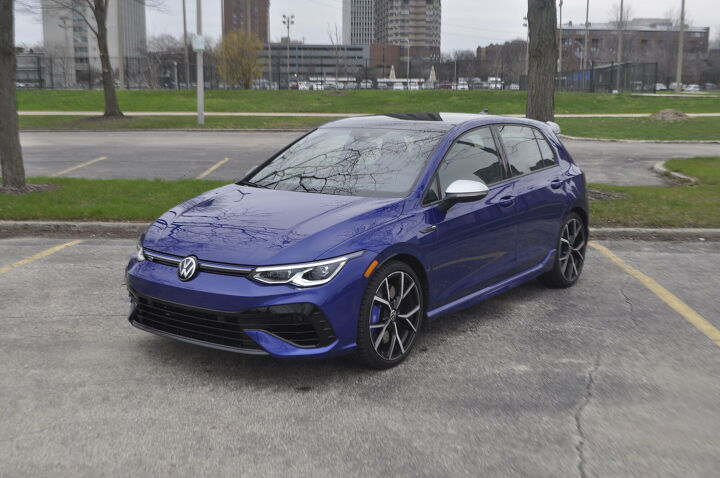
It’s hard to come up with a better hot hatch than the 2022 Volkswagen Golf R. Unfortunately, it’s also hard to build such a sublime vehicle and also make it a bargain.
If you’re on a budget, VW will happily sell you a GTI and you’ll get about 80 percent of the Golf R’s performance. On the other hand, if you have the scratch, the Golf R is worth it.
A recap of what’s new – the Mk8-generation Golf R gets more power, a digital cockpit, new drive modes, a driver-assist package, tweaks aimed at improving handling, and larger brakes.
Underhood is a 2.0-liter turbo four that makes 315 horsepower and either 280 lb-ft of torque when equipped with a six-speed manual, as my tester was, or 295 with the seven-speed DSG automatic transmission.
The all-wheel-drive Golf R has long drawn praise, and it earns it for a reason. The car handles like a dream, with a well-sorted personality and appropriately heavy steering, especially when in Race or Sport mode. Push a bit too hard and understeer creeps in, but it’s easy to predict as well as control.

The only flaws here are occasional bits of body roll and the occasional appearance of artificiality in the steering. Oh, and the ride is, perhaps predictably, on the stiff side, though it's acceptable for most urban driving. “Most” being the keyword – though the Golf R is pretty civilized when being driven gently, potholed and pockmarked roads can provoke some irritation.
DCC adaptive damping with torque vectoring is standard, along with an electronic differential lock, and the front suspension is a strut-type setup that has lower control arms. The spring rates on those lower control arms are stiffened by 10 percent for 2022. Camber is increased, as well. The spring rates for the rear multi-link suspension are also up 10 percent. There’s a rear anti-roll bar, and both the front and rear suspensions get other minor tweaks in a bid to improve handling.
Acceleration is, not surprisingly, swift – you’ll never worry about passing. The brakes are stout, and there’s no grabbiness.

If you like to have fun on closed roads, you can use a Drift mode to send all available torque to the outside rear wheel. There’s a Comfort mode for sedate driving, a Special mode that uses settings based on lapping the Nürburgring Nordschleife, and a mode that lets you customize settings.
That’s all fun, and stuff like that can enhance one’s experience, but there is such a thing as too much digitization. VW’s interior designers got a bit too enamored by the looks of a digital cockpit and forgot that user experience matters. I’m not a haptic-touch hater on principle, and I’ve seen the tech work well in some vehicles, but the execution here is frustrating. So, too, is the removal of knobs for basic controls. It’s one thing to bring forward new technology that looks and works differently from the old but is easy to get used to, and another to have tech for tech’s sake (or because it looks cool) but have it be functionally useless.
The UX harms an otherwise wonderful car. At least the UX that matters the most – driving – is better than what’s on hand for the cabin.
As good as the Golf R is, it’s not perfect. I’ve addressed the dreadful interior UX. Engine and tire noise can be a problem at freeway speeds, and while the clutch/shifter aren’t bad, they aren’t particularly a joy to use, either. Finally, some of the materials look and/or feel a bit downmarket, considering the sticker price.
Oh, and you won’t have much storage space – and you’ll need a USB-C to plug your phone in.

Golf Rs are distinguished from “lesser” GTIs by chrome quad exhaust tips, a different grille, bumpers, and side skirts; two-piece spoiler; unique interior logos and stitching; and painted brake calipers.
My test unit stickered at $43,645 with no options – the Lapiz Blue paint and manual transmission were standard. Standard features included LED lighting all around, 19-inch wheels, adaptive front lighting, fog lights, rain-sensing wipers, power panoramic sunroof, three-zone climate control, heated steering wheel, heated and cooled front seats, heated outboard rear seats, Nappa leather seats, multiple USB ports, and interior ambient lighting.

Other features included a customizable digital gauge display, head-up display, satellite radio, navigation, keyless entry and starting, Harmon Kardon premium audio, Apple CarPlay, Bluetooth, Android Auto, and wireless charging for devices. Safety/driver-aid tech includes adaptive cruise control, hill-hold assist, blind-spot monitoring, rear-traffic alert, lane-keep assist, semi-automated driving assist, automatic emergency braking, and blind-spot monitoring.

Volkswagen’s Golf R is an excellent driver’s car. It’s fast, fun to drive, handles well, and has excellent binders. Oh, and it offers hatchback utility. It sacrifices a bit in terms of noise and ride quality, but not much – you could easily live with it as a daily driver. The all-wheel-drive system doesn’t just help with handling, but also with inclement weather. The only real downside is the terrible infotainment control setup.
And the price. But then, one can’t expect near-perfection at a value price, right? You do get what you pay for.
What’s New for 2022
The 2022 Volkswagen Golf R gets more power, tweaks designed to improve handling, a new infotainment UX, more driver-aid tech, larger brakes, and new drive modes.
Who Should Buy It
The compact sports-car buyer who needs year-round utility and daily drivability – and has the bank account to pay for an uncompromising package.
[Images © 2022 Tim Healey/TTAC, Volkswagen]
Become a TTAC insider. Get the latest news, features, TTAC takes, and everything else that gets to the truth about cars first by subscribing to our newsletter.
via Autobuzz Today
Comments
Post a Comment